ACCEPTABLE WORDS Acceptable Words Prayers for the Writer Edited by Gary D. Schmidt
Elizabeth Stickney William B. Eerdmans Publishing Company
Grand Rapids, Michigan / Cambridge, U.K. 2012 Gary D. Schmidt and Elizabeth Stickney
All rights reserved Published 2012 by
Wm. B.
Eerdmans Publishing Co.
2140 Oak Industrial Drive N.E., Grand Rapids, Michigan 49505 /
P.O. Box 163, Cambridge CB3 9PU U.K. 18 17 16 15 14 13 12 7 6 5 4 3 2 1 Library of Congress Cataloging-in-Publication Data Acceptable words : prayers for the writer /
edited by Gary D. Schmidt, Elizabeth Stickney.
p. cm.
Includes bibliographical references and index.
ISBN 978-0-8028-6879-4 (pbk. paper)
ISBN 978-1-4674-3699-1 (epub)
1. paper)
ISBN 978-1-4674-3699-1 (epub)
1.
Authors Prayers and devotions.
I. Schmidt, Gary D. II. Stickney, Elizabeth.
BV4596.A85A33 2012
242'.68 dc23 2012027419 www.eerdmans.com To Leonard and Sue Kuyvenhoven
and
Ruth and Greg Boven,
with prayers of thanks Contents The soul of Man must quicken to creation. Out of the formless stone, when the artist united himself with stone, Spring always new forms of life, from the soul of man that is joined to the soul of stone; Out of the meaningless practical shapes of all that is living or lifeless, Joined with the artists eye, new life, new form, new colour. T. S. S.
ELIOT  When we see any man doe any work well, that belongs to the hand, to write, to carve, to play, to doe any mechanique office well... doe we not rather raise our contemplation to the soule, and her faculties, which enable that hand to do that work? JOHN DONNE
When we see any man doe any work well, that belongs to the hand, to write, to carve, to play, to doe any mechanique office well... doe we not rather raise our contemplation to the soule, and her faculties, which enable that hand to do that work? JOHN DONNE  You say grace before meals. All right. But I say grace before the play and the opera, And grace before the concert and pantomime, And grace before I open a book, And grace before sketching, painting, Swimming, fencing, boxing, watching, playing, dancing; And grace before I dip the pen in the ink. G. K.
You say grace before meals. All right. But I say grace before the play and the opera, And grace before the concert and pantomime, And grace before I open a book, And grace before sketching, painting, Swimming, fencing, boxing, watching, playing, dancing; And grace before I dip the pen in the ink. G. K.
CHESTERTON Let the words of my mouth, and the meditations of my heart, be acceptable in thy sight, O LORD, my strength, and my redeemer. PSALM 19.14 [KJV]  Y ou have an idea for a screenplay, novel, blog, article, drama, biography, memoir, poem, short story, long epic. The premise sets up housekeeping in your mind among all your other thoughts and agendas. It occupies you, this germ of human expression. You arrange your affairs so that you have the time to write. Its a hard business, this arranging, so you spend hundreds of dollars to go to a retreat center, away from your normal routines.
Y ou have an idea for a screenplay, novel, blog, article, drama, biography, memoir, poem, short story, long epic. The premise sets up housekeeping in your mind among all your other thoughts and agendas. It occupies you, this germ of human expression. You arrange your affairs so that you have the time to write. Its a hard business, this arranging, so you spend hundreds of dollars to go to a retreat center, away from your normal routines.
Now, back home, you clean your office again, and re-arrange the books that need re-arranging. Then you sit at your desk in your comfortable chair. Perhaps your son-in-law builds a fire in the woodstove to keep you warm. You sharpen your pencils, change the ribbon in the Royal typewriter, power up your laptop. And you set out to write. Except that the words do not flow as you had pictured them.
After a couple of hours, youre looking at only a meager couple of paragraphs. After lunch you decide to take a walk with the border collies under the pale autumn sun. When you return to your desk, your mornings effort looks insubstantial and shabby. Or pretentious and pointless. Unpolished and amateur. All of the above.
You start to throw it away and then stop. Its all you have, after all. Its something. Best to save it. You start again. If you were a writer in ancient Greece or Rome you would know the exact nature of your problem: you neglected to call down the power of the Muse.
Homer opens The Odyssey by requesting the Muse to sing to him the story of Odysseus, so that in turn he can relate it to his hearers. Virgil begins the Aeneid with this plea: O Muse! The causes and the crimes relate; / What goddess was provokd, and whence her hate. So. This style of invocation lasted a long time: Look in thy heart and write, chides Sir Philip Sidneys Renaissance Muse. John Milton, writing even later in Puritan England, adopts this convention in the opening lines of Paradise Lost. Of Mans first disobedience, and the fruit Of that forbidden tree whose mortal taste Brought death into the World, and all our woe, With loss of Eden, till one greater Man Restore us, and regain the blissful Seat, Sing, Heavenly Muse....
The contemporary writer who, like Milton, writes out of a faith tradition, might ask about the identity of Miltons Heavenly Muse. Was he addressing the Holy Spirit in these lines the One who came down at Pentecost with tongues of fire and new words? Should I, too, invoke the Spirit of God to give me my best ideas? To enable me to write stanzas that make my reader nod in agreement and wonder at my capacities and craft? To write novels and poems that reviewers praise? Sentences that make my own spirit glad? The Hebrew and Christian scriptures do not spend much time reflecting about the source of our writerly diction, the strategies of narrative point of view, the subtleties of tonality. Writers of the Biblical texts are more interested in immediately getting to the action of the story, exhorting the people of God to live lives of faithful obedience, or correcting mistaken teachings and assumptions that had taken hold in the community of believers. And those writers are interested, above all, in recording the incomparable works of the One who created our earth and gave us life and the ability to express our thoughts. The earth is the LORDs, and the fullness thereof, the Psalmist writes. O LORD our Lord, how excellent is thy name in all the earth! And this: The heavens declare the glory of God, and the firmament sheweth his handiwork.
Todays writer of faith echoes those sentiments in all earnestness and vigor. That writer, too, sees evidences of Gods glory in nature, and wants to find appropriate words to describe it. That writer, too, wants to understand the world and each persons place in it. That writer, too, wants to understand the dynamics of community, and the tension of individual belief. That writer, too, wants to understand what it means to be a writer and to exercise the gift faithfully. The writer of faith recognizes the call to live up to an identity as Gods image-bearer; the writer recognizes the call to use words in ways that bring honor to the One who gave language; the writer recognizes the call to use all capacity to appreciate and create beauty; and the writer recognizes the call to offer up our small voices in the universal anthem of praise.
Let the words of my mouth, and the meditations of my heart, be acceptable in thy sight, O LORD, my strength, and my redeemer. Acceptable. A small prayer, a humble one, tucked at the end of a long psalm that praises God for his glory, that uses all the trappings of royalty to describe that glory, then extols the goodness of Gods judgment and law. May my words be worthy to describe you, Lord. May they please you. May they reflect your glory.
May they make a difference. May they do what they were intended to do. Not all the prayers in this collection are addressed to God as the Heavenly Muse. Not all are focused on discovering the source of a writers inspiration, or calling down the Spirit of God to aid the writer in his or her literary efforts. But all of them reflect the writers attempt to understand what it means to live out a calling in this world of beauty, grace, and order and ugliness, hatred, and chaos. These are prayers seeking to understand what it is to make our words acceptable.

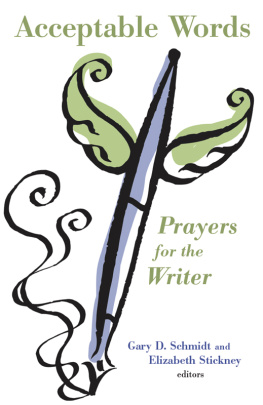

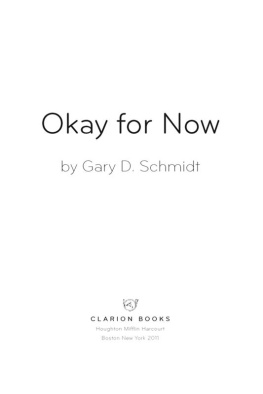
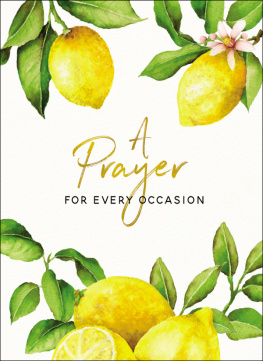
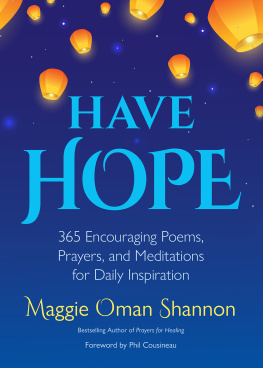
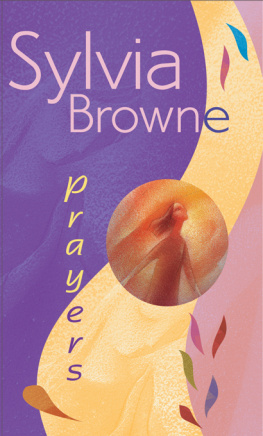
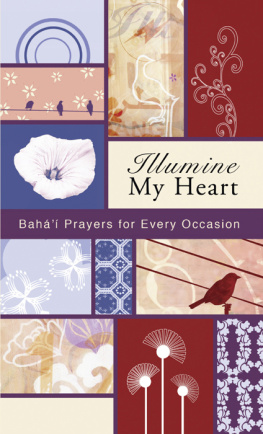
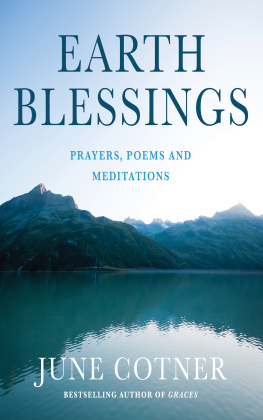


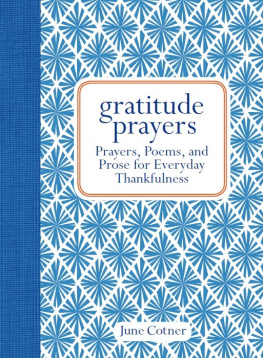
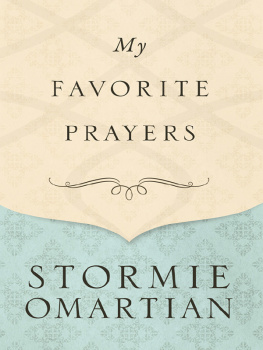
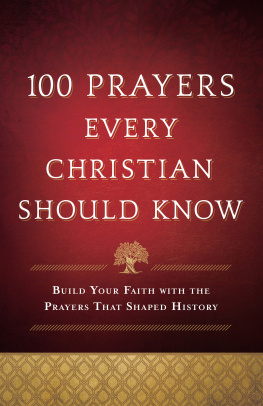
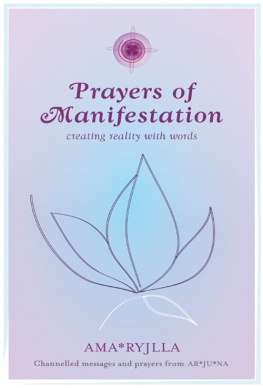

 When we see any man doe any work well, that belongs to the hand, to write, to carve, to play, to doe any mechanique office well... doe we not rather raise our contemplation to the soule, and her faculties, which enable that hand to do that work? JOHN DONNE
When we see any man doe any work well, that belongs to the hand, to write, to carve, to play, to doe any mechanique office well... doe we not rather raise our contemplation to the soule, and her faculties, which enable that hand to do that work? JOHN DONNE  Y ou have an idea for a screenplay, novel, blog, article, drama, biography, memoir, poem, short story, long epic. The premise sets up housekeeping in your mind among all your other thoughts and agendas. It occupies you, this germ of human expression. You arrange your affairs so that you have the time to write. Its a hard business, this arranging, so you spend hundreds of dollars to go to a retreat center, away from your normal routines.
Y ou have an idea for a screenplay, novel, blog, article, drama, biography, memoir, poem, short story, long epic. The premise sets up housekeeping in your mind among all your other thoughts and agendas. It occupies you, this germ of human expression. You arrange your affairs so that you have the time to write. Its a hard business, this arranging, so you spend hundreds of dollars to go to a retreat center, away from your normal routines.